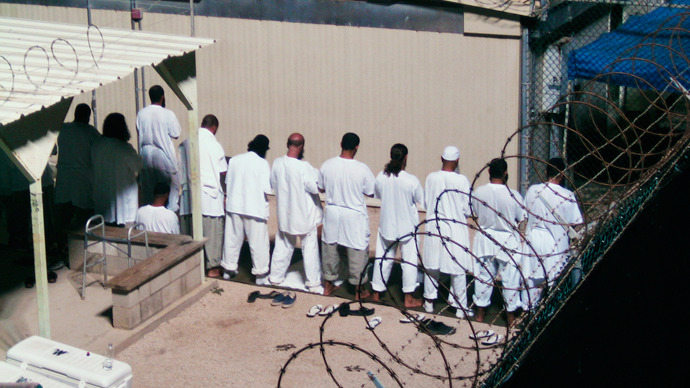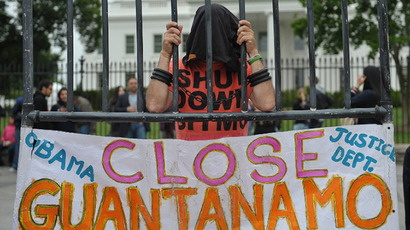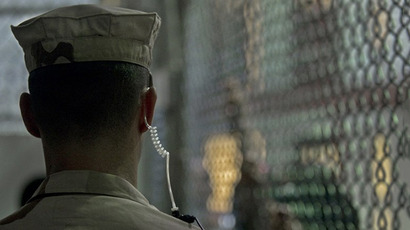Obama mulls resuming Guantanamo prison transfers - reports

Ahead of a major speech by President Obama involving US counterterrorism operations, the White House has indicated that it will include a plan to renew prisoner transfers out of Guantanamo Bay, with the ultimate goal of shuttering the prison.
Just as the Pentagon is requesting an additional $450 million in
funding to keep the detention center running, the administration
seems ready to push for the transfer of prisoners to their home
country.
“The president is considering
a range of options for ways that we can reduce the population there
and move towards ultimate closure - some of which we can take on
our own, but some of which will require working with the
Congress," White House Press Secretary Jay Carney said
Wednesday.
Obama, who has long placed blame on Congress for the continued
presence of detainees at Guantanamo, made the closure of the
military facility a campaign pledge during his 2008 run.
"That's an excuse,"
said Andrea Prasow, senior counterterrorism counsel at Human Rights
Watch.
"We're at the point now where
I think the president realizes he has to take what action he can
before he works with Congress. They'll be more amenable once
they've seen he's actually done something," added
Prasow.
Lifting the ban on Gitmo-Yemen transfers?
Currently, of the 166 detainees still held at Guantanamo 86 have
already been cleared for transfer, including 56 Yemenis, who
constitute the largest single group. The Pentagon has thus far
transferred only a handful of detainees whose release has been
ordered by courts.
The administration had specifically halted transfers to Yemen
following the attempted bombing of a Detroit-bound airliner by
members of a Yemen branch of Al-Qaeda in December 2009.
In a letter addressed to national security adviser Tom Donilon
in late April Senator Feinstein had requested resumption of
transfers of detainees to Yemen, citing continued support by that
country’s president, Abdu Rabbu Mansour Hadi, in continued
operations against Al-Qaeda. In the last few years, Yemen has
become a primary theater of operations by the US in drone strikes
against terrorist targets.
Although Al Qaeda “still has a
strong presence in Yemen, I believe it would be prudent to revisit
the decision to halt transfers to Yemen and assess whether
President Hadi’s government, with appropriate assistance, would be
able to securely hold detainees in Sana,” wrote
Feinstein.
According to the Wall Street Journal, resumption of transfers out of Guantanamo is likely to begin with non-Yemeni detainees, citing current and former officials. That would give Yemen’s government time to build up a rehabilitation and oversight program.
Widespread hunger strike adds urgency
Perhaps placing an even greater impetus on new policy for
Guantanamo Bay is the ongoing hunger strike by 103 detainees, of
which 31 are being forcibly fed through tubes.
The hunger strike has resulted in a number of detainees being hospitalized within the base, and human rights groups have been increasingly vocal regarding the force feeding practice, which includes painful nasal tube inserts and restraints.
Follow RT’s
day-by-day timeline of the Gitmo hunger strike.

Human rights advocates believe that detainees from Afghanistan
could be among the first transferred out of Guantanamo. The WSJ
reported that the US government has already been in talks with that
country’s government regarding prisoner transfers.
Supporters for the closure of the detention facility seem thus
far cautious ahead of Obama’s Thursday speech.
"He needs to make it clear he
is serious this time. He promised the same thing four years ago.
What makes this different? The transfers are what make this
different," said Prasow.
Moreover, the announcement for a renewed push to wind down the
prison is not likely to be received well by some lawmakers, such as
Republican Senator Kelly Ayotte, who has spearheaded efforts to
block transfers out of Guantanamo Bay.
"We know there is significant
Al-Qaeda activity in Yemen," she said. "I obviously have some serious questions
about Yemen."
Transfers out of Guantanamo slowed considerably in 2011 after
Congress imposed tough requirements. As a result, there was a
single transfer in 2011, four transfers in 2012 and none so far in
2013.
Administration officials have said the president will finally
fill a vacant State Department position tasked with overseeing the
transfer of detainees, as well as recommend a review board to
resume transferal cases.
In January, the U.S. State Department re-assigned Daniel Fried,
the special envoy who had been in charge of persuading countries to
take Guantanamo inmates approved for transfer.
That vacancy was viewed by both Guantanamo inmates and human
rights group as a flagrant sign that the administration did not
consider shuttering Guantanamo a priority.














